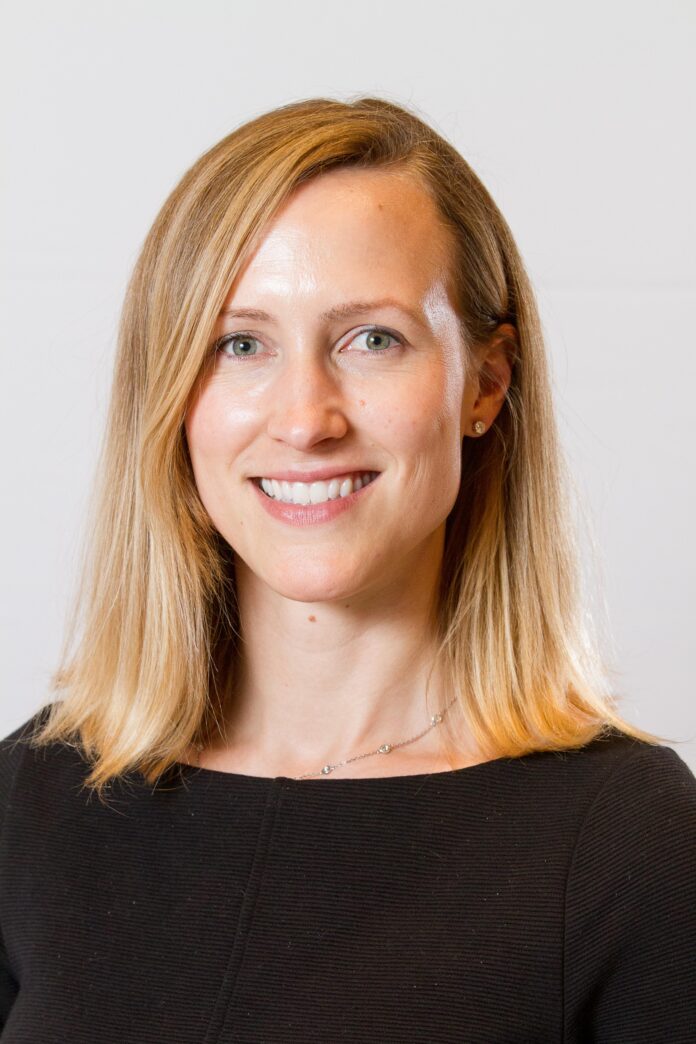Dr. Elizabeth Goldberg is an emergency medicine doctor with Brown Physicians Inc. and an attending physician at The Miriam and Rhode Island hospitals. Earlier this year, she received the Paul B. Beeson Career Development Award, an annual honor given to doctors in the early stages of their career who have shown leadership in geriatrics research.
The award will help fund Goldberg’s five-year $1.1 million project titled “The Geriatric Acute and Post-Acute Fall Prevention Intervention II,” which is now underway.
The work aims to reduce repeat falls in patients who have been treated in the emergency room for fall-related injuries.
PBN: Please explain how your research project works.
GOLDBERG: Our research is focused on helping adults age in place, and stay healthier longer. We recognize that falls are one of the most common causes for emergency department visits and we would like to be able to provide patients with the tools they need to prevent recurring falls.
The multiyear research project involves approaching patients who come to the emergency departments of Rhode Island Hospital and The Miriam Hospital for fall-related injuries.
If they consent to being part of the research, patients are trained on using an Apple Watch, they’ll answer questions about their health and record any fall events on their phones. We will then use the data we gain from interviews and the recording devices to inform the clinical trial, which begins in one to two years. Participants in that portion of the study who are admitted to the ER for a fall will receive an intervention bundle – a brief medical consultation with physical therapy, motivational interviewing and a medication evaluation – that could help patients decrease their risk for a fall.
People will remain in the study for 12 months and provide us feedback on their cognition, fitness and fall events during that time.
PBN: How many patient participants are involved, and is it too early to discuss preliminary findings from the first stage of the project?
GOLDBERG: Our first study on fall prevention, GAPcare I, just closed and we recruited 110 patients. What we learned is that patients and caregivers want to receive interventions to help prevent falls in the emergency department and many appreciated the additional help that physical therapists and pharmacists could provide in the hospital prior to discharge.
We also learned that our model is feasible on a larger scale. Our work is performed during emergency department stays that does not prolong the length of time patients spend waiting. We are still analyzing if this model reduces recurring falls, health care visits and costs. It is likely that a larger study will be needed to answer those questions definitively.
For GAPcare II, study participants will include patients with dementia and cognitive decline. To help with this work, caregivers will need to be involved and that would bring the total number of participants to 230.
PBN: Does being a recipient of the Beeson Award help give your work any extra exposure?
GOLDBERG: The Beeson Award is giving Rhode Island the opportunity to be a leader in age-friendly care. We have one of the oldest populations in the United States and our health care models should be tailored to accommodate these patients.
It is an incredible honor to be named a Beeson recipient, and I am thrilled to bring a geriatric emergency medicine model to Lifespan and Brown Physicians Inc., which could eventually be adopted in other states.
PBN: Are you partnering with any other researchers or medical facilities with this work?
GOLDBERG: I have been in conversations with many leaders in the geriatric medicine space, specifically at Mount Sinai Hospital, the Boston Medical Center and Northwestern. The plan is to scale this model to other hospitals that have the American College of Emergency Physicians’ accreditation as a “Geriatric Emergency Department” or hospital systems that have embraced age-friendly care.
PBN: What do you hope to ultimately accomplish with this project?
GOLDBERG: Ultimately, I want to make sure that older adults leave the emergency department with the tools and knowledge they need to prevent recurrent falls. Our current model of care involves an injury assessment and treatment of injuries, but those solutions don’t address the root of the problem.
We know that only one in four patients tell their primary care doctors that they had a fall. Those patients might avoid care because they may feel embarrassed, and it is important that we share information about the frequency of falls while providing strategies that place them on the path to avoiding future injuries.
Elizabeth Graham is a PBN staff writer. She can be reached at Graham@pbn.com.












